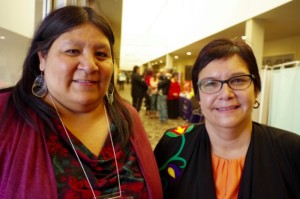Dilico Wiichitiwin conference creates important dialogue for prevention and planning for mental health

By Rick Garrick
THUNDER BAY– First Nation communities served by Dilico, including Biigtigong Nishnaabeg, Biinjitiwaabik Zaaging Anishinaabek, Fort William, Long Lake #58, Michipicoten, Pic Mobert, Pays Plat and Red Rock Indian Band, gathered in Thunder Bay for the Dilico Anishinabek Family Care’s Wiichitiwin Conference on May 31 to June 1.
Blythe Haynen, Dilico’s Community Engagement Manager, says the conference brought together a blend of education and discussion groups to discuss how to move forward in prevention and planning for the 13 communities with respect to health, mental health and addictions, and child welfare.
“The response has been overwhelmingly positive,” Haynen says. “Everyone’s had some great feedback about the dialogue we’ve had about the shift that has gone on at Dilico and looking forward at prevention planning and getting to the root cause of the issues we are seeing today,” she continued.
Darcia Borg, Dilico’s Executive Director, says the conference is about working together. She emphasized the message delivered by the Pow Wow Rangers during lunch break on the second day.
Long Lake #58’s Health Clinic Health Director and Councillor, Judy Desmoulin, spoke about intergenerational trauma and its impacts during Dilico Anishinabek Family Care’s Wiichitiwin Conference in Thunder Bay. Desmoulin delivered her presentation on the second day.
“With all the experiences and stories we are hearing from our people, we are beginning to understand the intergenerational trauma and the intergenerational effects,” says the Long Lake #58 health social director.
“They are sharing their stories and that’s really what this conference is about,” Desmoulin says. “Often as Aboriginal people, we are portrayed and we always hear the negative and the sadness that is happening. But there is a lot of success that is happening right within our own communities, and we really want to work together,” noted Desmoulin.
“If we don’t provide opportunities for healing and if we don’t provide knowledge and information to our people, then they won’t be able to change,” added Desmoulin.
Desmoulin issued a challenge to the conference participants to provide opportunities for change to people who are affected by intergenerational trauma.
“If they don’t choose to deal with this trauma, then they just continue to pass it on and continue to affect the next generation,” Desmoulin says. “So we’ve all got to do our part to help people take care of that … so we no longer transmit it, and be healers instead of transmitters,” she continued.
Pays Plat’s Christopher Mushquash, Canada Research Chair in Indigenous Mental Health and Addiction, delivered a keynote presentation on the importance of culture-based approaches to mental wellness on the first day of the conference.
“I talked about how mental wellness could be thought about in a different way than the mental health system usually thinks about it,” Mushquash says. “One of the nice things about our First Nations is there is a lot of good work going on where people understand that in order to improve wellness in their communities, we have to think about it from a cultural place, from a holistic place,” he added.
Mushquash says the conference was a great opportunity for leadership, front-line staff and other people working on mental health and substance use issues to share ideas and plan for the future.
“To talk about how do we move from responding to the kind of difficulties that come up day to day toward having a longer-term plan as to the things we want to address,” Mushquash says. “Anytime we can come together to do that is excellent,” stated Mushquash.
Pays Plat Councillor Raymond Goodchild enjoyed Mushquash’s presentation.
“I thought he was down to earth, empowering the communities, giving us strength to carry on and to make us aware of the many talents and skills that we have,” Goodchild says.
Goodchild poignantly added that “All we have to learn is how to hear them and develop them and work on them and help each other in unity. Our greatest strength is unity.”


